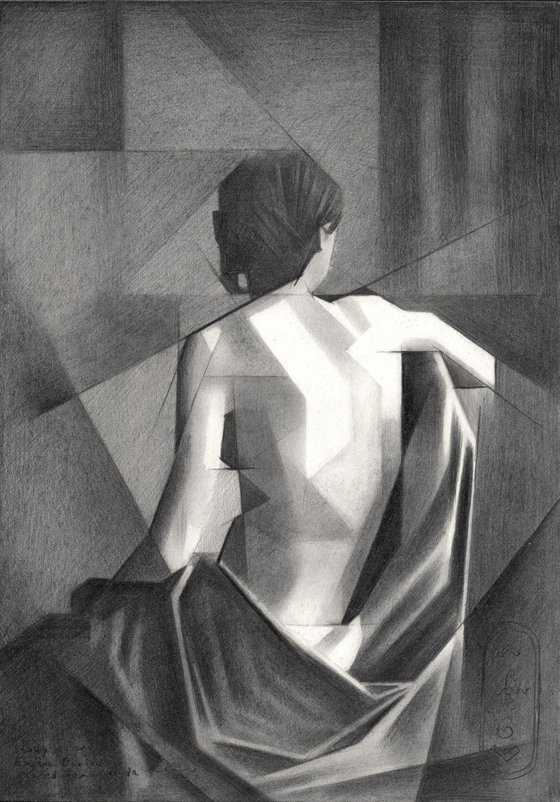- By medium
- By subject
- By budget
- Sales
- Gift cards
- Discover all art
- Artists
- Editors’ picks
- Ideas
Original artwork description:
Lovely Folds
After my last drawing of Geesje Kwak I did not have many new ideas. Then I remembered I had a photo of a seated female nude by Eugène Durieu. It contains a lovely sequence of folds in a cloth draped loosely around a nude. Often these 19th century photos show old-fashioned motifs. Victorian clothing and old fashioned hairdo’s are not my favorites but this one has a timeless look. The photograph almost could have taken yesterday and could even be considered as contemporary art for eternity.
Durieu’s Work
You have to know I knew Durieu’s work already for a long time. Like me he also was a lawyer who turned to art later in life. My pastel l’Odalisque was based on his picture and I am not the first. Delacroix also used it for one of his oils. Time to do another one and I am eager to continue the study after the texture of fabrics.
Variation in Repetition
The working method this time was basic but essential. I used only straight contour delineations. Different from previous drawings I did not long for the invention of new forms. Therefor I used my kind of cubism from the past more or less. Some forms are defined by dark linear structures, some are bounded by soft tonal gradients. This way I was able to create variation in harsh and soft looking objects. As in many of my art works I use the principle of repetion in variation and variation in repetition. Although the dominant object in the motif was very charming I was not particularly impressed by its background. Therefor I decided to extrapolate plain delineations within the body outwards and turn them into a division dark and light plains. Only the folds in the right upper corner are vague reflections of the original ones in the photo.
Graphite pencil (Sakura 0.5 mm, Pentel 4B) drawing Talens Bristol paper (21 x 29.7 x 0.1 cm)
Artist: Corné Akkers
Materials used:
Graphite pencil drawing (Sakura 0.5 mm, 4B) on Talens Bristol paper (21 x 29.7 cm - A4 format)
Tags:
#cubism #chiaroscuro #artistic nude #akkers #corneStudy after Eugène Durieu’s Seated Female Nude – 20-08-21 (2021) Pencil drawing
by Corné Akkers
8 Artist Reviews
£1,283.55
- Pencil drawing on Paper
- One of a kind artwork
- Size: 21 x 29.7 x 0.1cm (unframed) / 21 x 29.7cm (actual image size)
- Signed on the front
- Style: Geometric
- Subject: Nudes and erotic
Loading
Original artwork description
Lovely Folds
After my last drawing of Geesje Kwak I did not have many new ideas. Then I remembered I had a photo of a seated female nude by Eugène Durieu. It contains a lovely sequence of folds in a cloth draped loosely around a nude. Often these 19th century photos show old-fashioned motifs. Victorian clothing and old fashioned hairdo’s are not my favorites but this one has a timeless look. The photograph almost could have taken yesterday and could even be considered as contemporary art for eternity.
Durieu’s Work
You have to know I knew Durieu’s work already for a long time. Like me he also was a lawyer who turned to art later in life. My pastel l’Odalisque was based on his picture and I am not the first. Delacroix also used it for one of his oils. Time to do another one and I am eager to continue the study after the texture of fabrics.
Variation in Repetition
The working method this time was basic but essential. I used only straight contour delineations. Different from previous drawings I did not long for the invention of new forms. Therefor I used my kind of cubism from the past more or less. Some forms are defined by dark linear structures, some are bounded by soft tonal gradients. This way I was able to create variation in harsh and soft looking objects. As in many of my art works I use the principle of repetion in variation and variation in repetition. Although the dominant object in the motif was very charming I was not particularly impressed by its background. Therefor I decided to extrapolate plain delineations within the body outwards and turn them into a division dark and light plains. Only the folds in the right upper corner are vague reflections of the original ones in the photo.
Graphite pencil (Sakura 0.5 mm, Pentel 4B) drawing Talens Bristol paper (21 x 29.7 x 0.1 cm)
Artist: Corné Akkers
Materials used:
Graphite pencil drawing (Sakura 0.5 mm, 4B) on Talens Bristol paper (21 x 29.7 cm - A4 format)
Tags:
#cubism #chiaroscuro #artistic nude #akkers #corne14 day money back guaranteeLearn more

